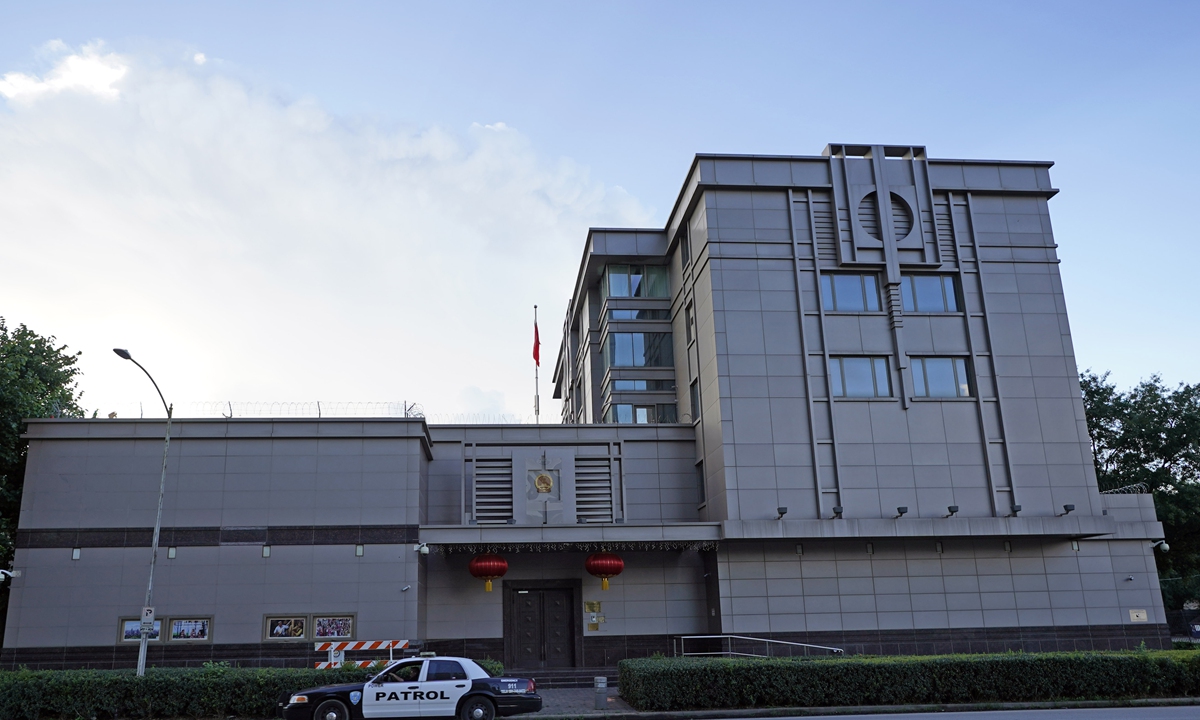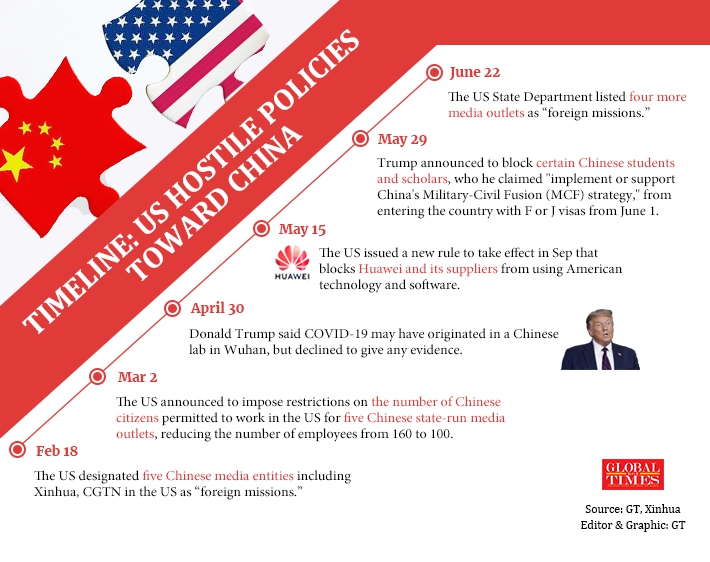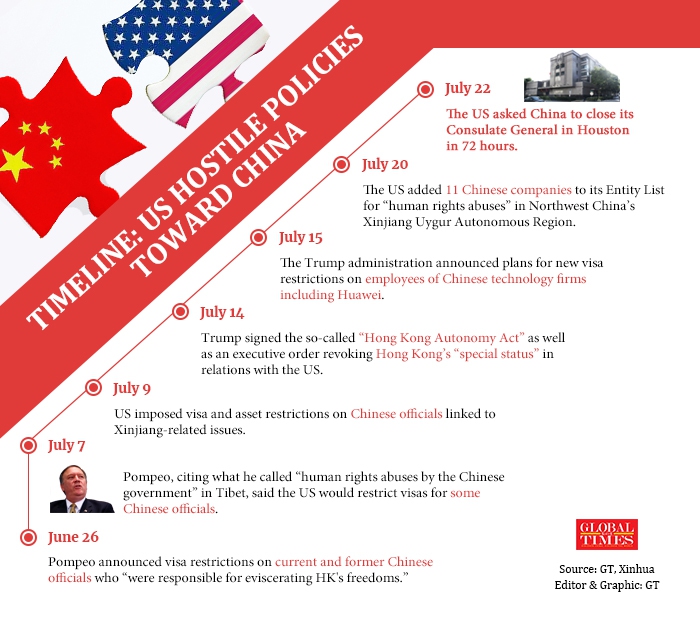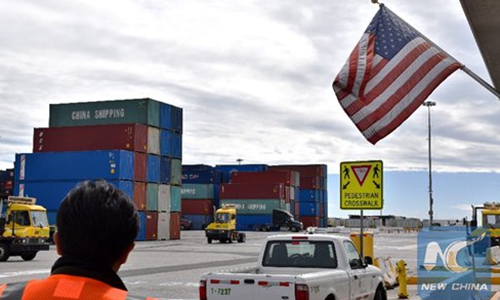
A security guard drives away from the Chinese Consulate General in Houston on Wednesday. Photo: AP
China on Thursday defied widespread expectations for announcing looming countermeasures against the US order to close the Chinese consulate in Houston, indicating what analysts call China's "strategic patience and calm" to ensure that its response is both proportionate and painful for the US.
The lack of an announcement on Thursday, which left questions open as to which US consulate, if any, would be closed in retaliation, could be due to the fact that China will thoroughly calculate the implementation, intended impact, and possible US reactions to its countermeasures, in line with China's long-standing decision-making process, analysts said.
They predict that the closure of a US consulate is a practical option. But because the US has sent many intelligence agents to China under the diplomatic cover, China could also consider expelling hundreds of US "diplomats," since the Trump administration has provided a perfect chance for Beijing to contain Washington's egregious activities in China.
The US piled on its accusations against China on diplomatic and intelligent affairs following the closure of China's consulate in Houston. The FBI alleged that a Chinese biological researcher "connected to the Chinese military" has avoided arrest due to "visa fraud" by taking refuge in the Chinese consulate in San Francisco, CNN reported on Thursday.
US President Donald Trump said on Wednesday it was "always possible" he would order the closure of more Chinese consulates in the US, Reuters reported on Thursday.
Lü Xiang, a research fellow at the Chinese Academy of Social Sciences in Beijing, told the Global Times on Thursday that the Trump administration is turning US diplomacy into a joke as they didn't prove the Chinese consulate harmed US national security. But if China decides to hit back, the US has a lot more targets, and China has solid and hard evidence.
A national security and intelligence expert who requested anonymity told the Global Times that Chinese diplomatic institutes overseas are not like those Western countries' diplomatic missions in China, because diplomats we sent there are not intelligence agents, but only for diplomatic matters and consular services.
"But the US is different. Its consulate in Hong Kong is a typical example. More than half of the employees there are CIA (Central Intelligence Agency) agents, so the US diplomatic missions in China are also responsible for many unseen and undercover activities. This time, the US is actually offering an excuse for us to deal with this long-standing problem," he noted.
When Edward Snowden, the former CIA employee responsible for one of the most significant leaks of US intelligence, escaped from the US to Hong Kong in 2013, he also confirmed with the media that "We have got a CIA station just up the road - the consulate here in Hong Kong," the Guardian reported.
The anonymous expert said that "closure of our consulate might create inconvenience for our nationals and affect our normal exchanges and cooperation with Americans, but if we close US consulates in China, it would be a big hit to US intelligence services. So the US might eventually regret what they have done."

Infographic: GT
Serious harm
The closure of the Chinese consulate seriously harms bilateral ties. It could also put business ties between China and the eight US states that the consulate serves in jeopardy, as the work of the consulate to promote economic and trade cooperation would be stopped, according to former Chinese diplomats, experts and business leaders in the US.
Zhu Ying, a professor of international law at Southwest University of Political Science and Law, who had lived in Texas for many years, told the Global Times that the Chinese consulate in Houston is responsible for many affairs related to Chinese in eight states in Southeast US. The closure brings inconvenience to Chinese living in the US.
The US move is deteriorating bilateral ties, and if a tit-for-tat battle to close each other's consulates starts, less communications and more miscalculations would be made, he said.

Infographic: GT
Targeted strike
China's countermeasures should be precise and minimize the harm to the long-term interests of the peoples of the two countries. So maybe expelling US "diplomats" who actually work for the CIA would be a harmless option for the China-US people-to-people exchanges, but will effectively strike the US government.
"The foreign consulates in China provide services and convenience for normal exchanges and economic cooperation, so China can also consider leaving US consulates open, but put a strict limit on the number of employees and diplomats, and expel those who have been involved in espionage activities. This would be an effective countermeasure," he noted.
Some observers and foreign media speculated that the US consulate in Wuhan will be closed by China as retaliation, but Chinese analysts said this is very unlikely as the consulate is small, and most US personnel are not there due to the COVID-19 epidemic situation. Closing the Wuhan consulate would be insignificant compared to the US' reckless order to close China's consulate in Houston.
Although the incident of forced closure of China's consulate in Houston is unprecedented in the history of China-US relations, analysts remained confident that the two sides would prevent tensions from escalating, such as military conflicts.
In 2017-2018, similar tensions happened between Russia and the US, as Washington forced Moscow to close its consulate in San Francisco, and Russia retaliated with the closure of the US consulate in St. Petersburg, but the incident didn't cause the two sides to spread tensions to other areas.
The Trump administration is very unpredictable, and its policymaking is a total mess, so it is hard to predict what it would do next. But based on what happened between Russia and the US, the possible moves would be expelling diplomats, said the anonymous expert, adding that Chinese nationals in the US, including students, scholars and businesspeople, could also be targeted.
Lü said "any move except war" would be possible for the US to further harm bilateral ties, as long as it can draw attention and serve Trump's goal of winning reelection.
"If the Trump administration continues its reckless behavior, it would be hard for the US to fix its ties with China. China will make sure that every move it will make to harm China will be met with a strong response," he noted.



